17 Olive Oil Substitutes for Cooking

The right olive oil substitute can be incredibly helpful when you don't have any to hand, allowing you to continue with your recipe. Having a list of alternatives to this common oil can also be useful if you’re curious about working with ingredients that add a different flavor profile to a dish that originally calls for olive oil.
Whether you’re cooking, baking or preparing a salad dressing, there’s an olive oil substitute that will do the job! From other plant-based oils to dairy alternatives, every olive oil substitute covered in this guide brings its own unique qualities to your cooking and may become a staple ingredient in your kitchen even when you have olive oil available.
What Is Olive Oil Used for in Cooking?
Olive oil serves multiple purposes in the kitchen, from acting as a base for sautéing to being a key ingredient in marinades. Additionally, olive oil is a great emulsifier, helping to blend ingredients smoothly in salad dressings, sauces and dips.
No matter what type of cooking you're doing with olive oil, its vibrant flavor enhances the taste of fresh foods while being neutral enough to never overpower other ingredients and flavors. Olive oil's healthy fats additionally contribute to texture and moisture in baking.
It's important to note that this oil's mid-range smoke point (350 to 430 degrees Fahrenheit for extra virgin olive oil and 390 to 470 degrees Fahrenheit for other kinds) means it is not suitable for all types of cooking methods, like deep frying. However, olive oil can help prevent sticking during lighter frying and allows for even heat distribution when used over low to medium heat, ensuring that ingredients cook properly.

17 Best Substitutes for Olive Oil
1. Grapeseed Oil
Grapeseed oil is a good olive oil substitute because of its mild flavor and high smoke point, lending itself to various cooking methods. Unlike olive oil, which has a somewhat distinct taste, grapeseed oil's neutral flavor allows it to blend into dishes without overpowering other ingredients. This makes it particularly suitable for recipes where you want the other flavors to shine.
This oil is best used as an olive oil substitute for high-heat cooking like sautéing, frying and roasting due to its smoke point, which is higher than that of many other oils. It's also rich in polyunsaturated fats and vitamin E, contributing to its appeal as a healthy cooking oil.
While not as common in salad dressings as olive oil, grapeseed oil acts well as an emulsifier and can be used in place of olive oil in dressings like honey mustard or balsamic vinaigrette. As an olive oil substitute, you can generally use it in a 1:1 ratio.

2. Sunflower Oil
Sunflower oil is another olive oil substitute with a mild flavor and high smoke point. It's ideal for recipes where olive oil’s taste might be too strong. While you could use sunflower oil in a dressing or a no-cook sauce like vegan pesto in a pinch, it’s best used as an olive oil substitute in cooked dishes.
To substitute, use sunflower oil in a 1:1 ratio with olive oil. This simple swap provides a similar texture and cooking performance, making sunflower oil an easy and reliable replacement in many dishes.
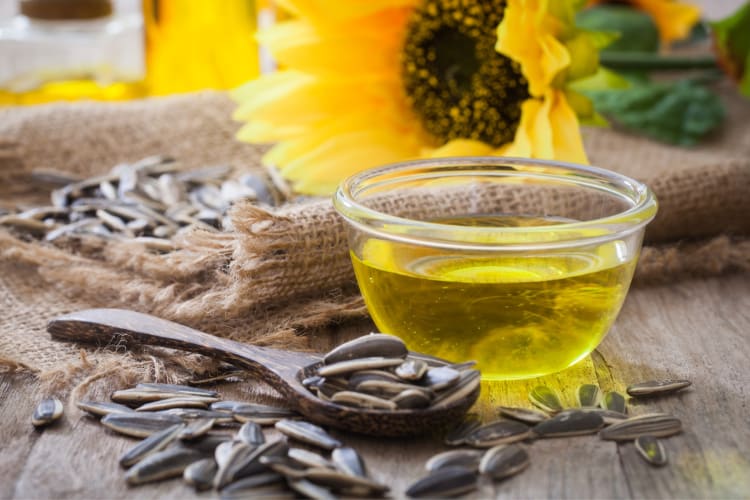
3. Avocado Oil
With a high smoke point and neutral flavor, avocado oil is versatile for a variety of cooking methods. It's one of the best oils for frying and can also be used in place of olive oil for sautéing and roasting.
As one of the healthiest cooking oils, avocado oil is rich in healthy monounsaturated fats and has a similar nutritional profile to olive oil. The best avocado oil offers a light, buttery taste that works well in dressings or drizzled over salads as a stand-alone ingredient. To substitute, use a 1:1 ratio.
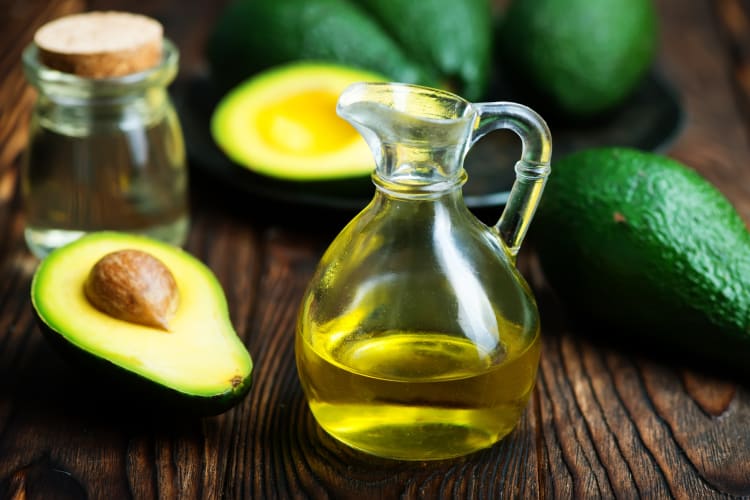
4. Peanut Oil
Peanut oil is a great olive oil substitute due to its high smoke point, making it ideal for cooking with. It’s particularly well-suited for dishes where you don’t want the oil to overpower other ingredients, such as stir-fries or deep-fried foods. To substitute for olive oil, use mild-tasting peanut oil in a 1:1 ratio.
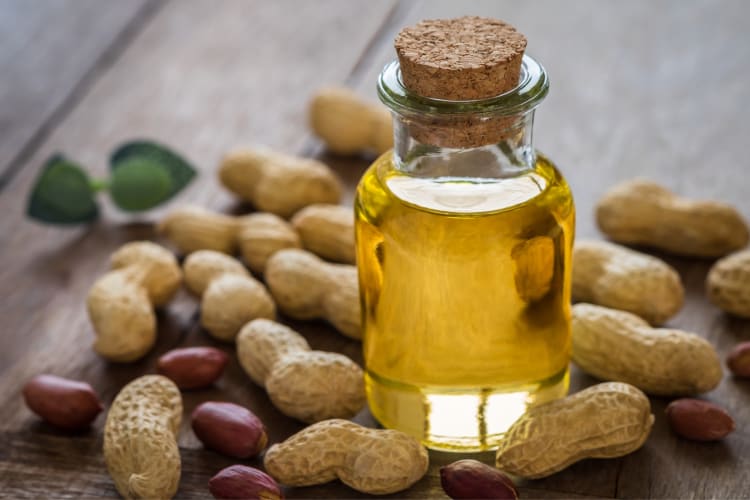
5. Canola Oil
For a multi-use olive oil substitute with a neutral flavor, try canola oil. With a higher smoke point than olive oil, canola oil is perfect as a replacement for olive oil in cooked dishes, especially those that involve frying or deep-frying.
However, this isn’t the best choice if you are looking for an olive oil replacement for dressings or marinades. As with most substitutes for olive oil on this list, you can substitute canola oil for olive oil in a 1:1 ratio.

6. Ghee
Ghee, a type of clarified butter, is an excellent olive oil substitute due to its rich, nutty flavor and high smoke point. Unlike olive oil, ghee adds a rich and buttery depth to dishes. This versatile fat works well in many cooking applications, from roasting vegetables to cooking meats for curries. However, it won’t work as an olive oil substitute in dressings or marinades.
As a substitute for olive oil, use ghee in about equal amounts, keeping in mind that ghee is solid at room temperature, so it’s best melted before use in recipes where liquid oil is required. As it has quite a high fat content, you may want to add it gradually to avoid creating an overly oily dish.

7. Palm Oil
Another olive oil substitute with a neutral flavor and high smoke point is palm oil. It has a stable structure that withstands high temperatures without breaking down, making it ideal for high-heat cooking.
While it lacks the distinct taste of olive oil, it provides similar cooking benefits and can be particularly useful in recipes where a neutral flavor is the goal, such as in baked goods and stir-fries. Use palm oil in a 1:1 ratio for olive oil in recipes.
When using this olive oil substitute, search for a sustainable brand, ideally, one with an RSPO label that indicates it is certified sustainable palm oil.

8. Butter
Butter is a flavorsome olive oil substitute due to its rich, creamy quality and ability to enhance the taste of many dishes. It works exceptionally well as a substitute for olive oil in baking, where it adds moisture and a tender texture to cakes and other baked goods.
In savory cooking, butter serves up delicious depth to sautéed meats or vegetables and dairy-based sauces. Understandably, butter won’t work as an olive oil substitute in salad dressings or marinades.
To substitute butter for olive oil, use a 1:1 ratio, but keep in mind that butter has a lower smoke point than olive oil, so it’s best suited for lower to medium heat applications. As with ghee, it can also be a good idea to use it gradually to avoid adding too much fat to your recipe.
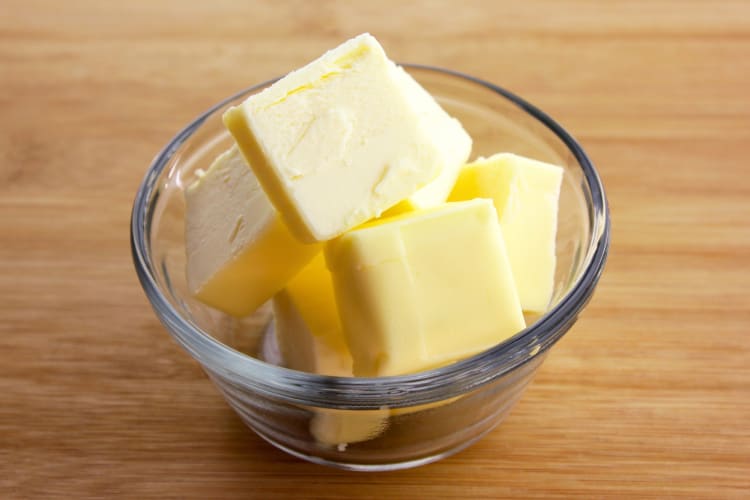
9. Coconut Oil
Another great olive oil substitute is coconut oil. Its mid to high smoke point makes it ideal for high-heat cooking methods like sautéing and frying. Its mild, slightly sweet taste can add a unique twist to both savory and sweet dishes, upgrading your baked goods and stir-fry dishes.
As an olive oil alternative, use a 1:1 ratio, keeping in mind that it may impart a subtle coconut flavor to your recipes. However, this can be a benefit and makes it particularly well-suited to dishes that already have coconut flavors, such as Thai red curry or coconut curry chickpeas.

10. Flaxseed Oil
Flaxseed oil is a unique olive oil substitute, offering a nutty flavor and high omega-3 fatty acid content, which adds a nutritional boost to your dishes. Best used in cold applications like salad dressings, as a finishing oil or incorporated into no-cook spreads like pesto or tapenade, it will supercharge the nutritional profile of your meals and add a different but delicious flavor profile.
This oil isn’t suitable for high-heat cooking due to its low smoke point. It can also dry other ingredients out when heated, so baking with it is not recommended. You should use about a quarter of the amount of olive oil called for when using flax seed oil instead, gradually adding more if needed.
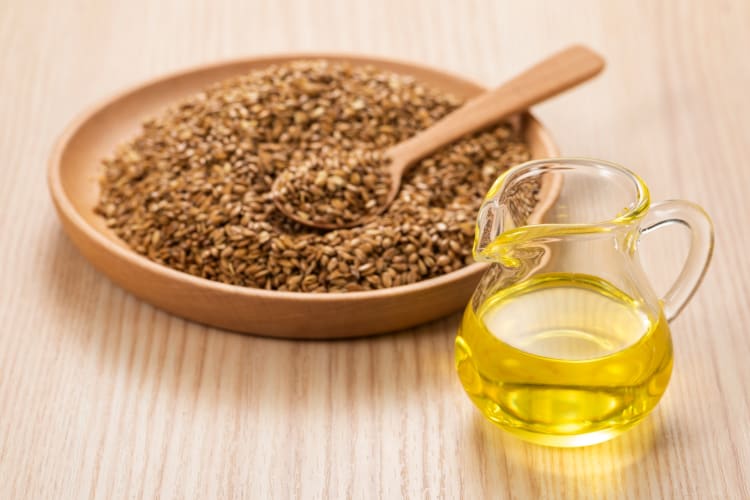
11. Walnut Oil
Looking to add a rich, nutty flavor to your dishes? Then opt for walnut oil as an olive oil substitute. Its unique taste can enhance dressings and marinades, bringing a gourmet touch to salads and roasted vegetables. It's notably a great substitute for a walnut pesto, enhancing the walnut-heavy flavor profile.
Walnut oil is best used in low-heat cooking or as a finishing oil because it has a lower smoke point than olive oil. To substitute walnut oil for olive oil, use it in a 1:1 ratio in recipes where the earthy flavor complements the dish.
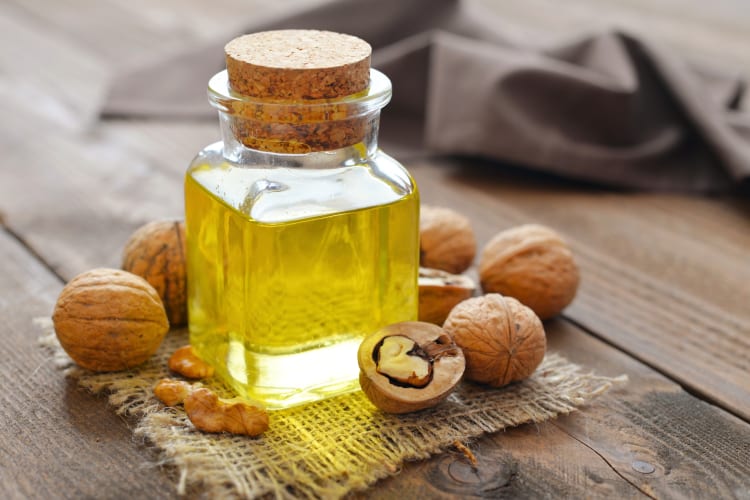
12. Almond Oil
Almond oil can be used as an olive oil substitute in recipes requiring baking, sautéing and roasting, adding a subtle depth to both sweet and savory dishes. Almond oil also works well in salad dressings and marinades, where its unique flavor can shine through. It can even be used in some baked goods that call for olive oil, such as an orange olive oil cake.
To substitute almond oil for olive oil, use it in a 1:1 ratio. Keep in mind that the nutty undertones of this olive oil substitute might slightly alter the dish's overall taste. Due to this, it’s best used in recipes where the flavor blends well with the other ingredients. Adding to taste is recommended if you’re concerned about the change in flavor profile.

13. Vegetable Oil
Vegetable oil is a versatile olive oil substitute due to its neutral flavor and high smoke point, making it ideal for high-heat cooking methods like frying and sautéing. This olive oil substitute’s lack of a strong taste allows the other ingredients in your dish to shine without being overshadowed.
To substitute vegetable oil for olive oil, use a 1:1 ratio in recipes. While it lacks the distinct flavor of olive oil, vegetable oil effectively performs the same functions in cooking, ensuring your dishes remain delicious and well-cooked.

14. Sesame Oil
Sesame oil has a rich taste that is ideal for Asian cuisine, enhancing stir-fries, dressings and marinades with a depth of flavor that olive oil can't provide. This olive oil substitute is best used in recipes where the nutty flavor works well with the overall dish, such as in sesame-crusted chicken or vegetable stir-fries. As an olive oil alternative, use it in a 1:1 ratio, but be mindful of its stronger taste, adding gradually to taste if desired.
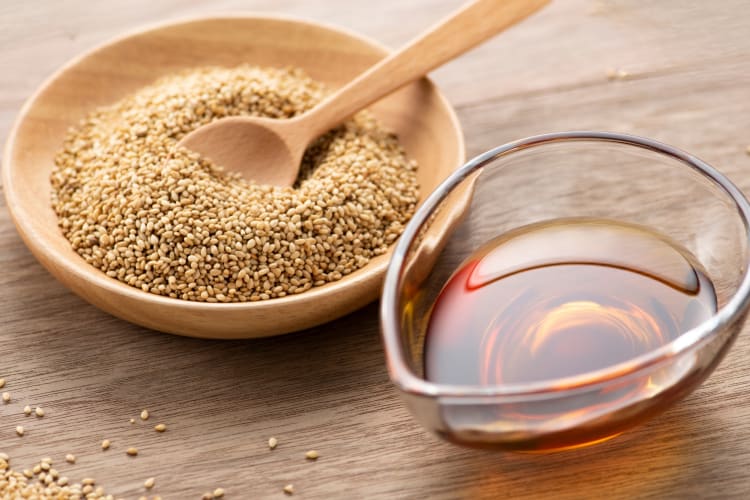
15. Mashed Banana
While it may sound unusual, mashed banana is a surprisingly effective olive oil substitute if you’re looking to replace olive oil in baking. Its natural sweetness and moisture help keep baked goods tender and add a subtle fruity flavor. Ideal for treats like muffins and cakes, mashed banana can replace olive oil in a 1:1 ratio.
Simply mash ripe bananas until smooth and use them in place of olive oil. Using this olive oil substitute not only reduces fat in your dish but also adds extra nutrients like potassium, making it a healthful choice for baking sweet treats that had initially called for olive oil as the fat.
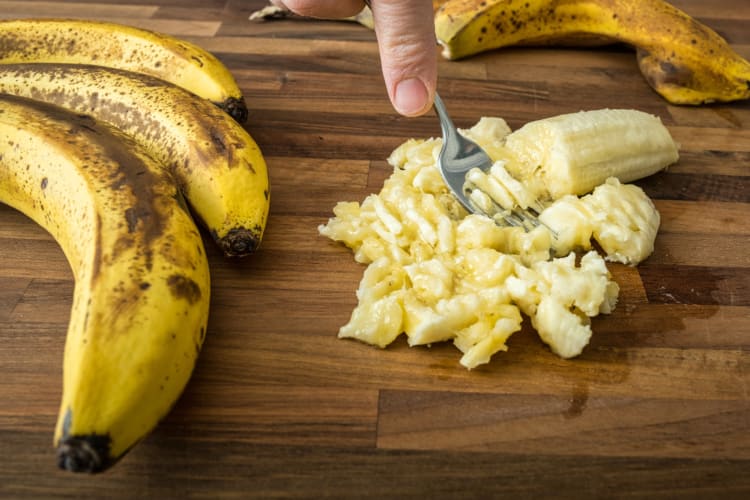
16. Hemp Seed Oil
Hemp seed oil is an interesting olive oil substitute on account of its unique nutritional profile and mild, nutty flavor. Rich in omega-3 and omega-6 fatty acids, it's one of the healthiest alternatives to olive oil.
Hemp seed oil is best used in cold applications like in salad dressings or as a finishing oil. Its lower smoke point makes it less suitable for high-heat cooking. Use hemp seed oil in a 1:1 ratio for olive oil in recipes, allowing the oil’s flavor and distinctive taste to shine.
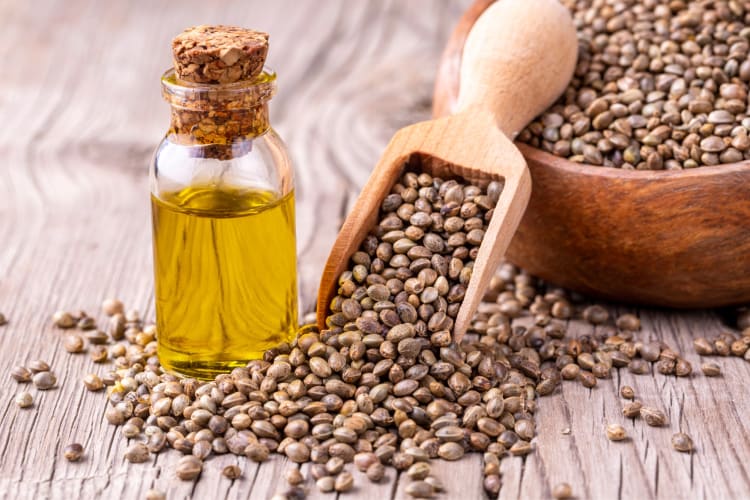
17. Soybean Oil
Soybean oil is ideal for frying and sautéing due to its relatively high smoke point. It also provides a light taste that won't overpower your dishes. Its ability to withstand high temperatures without burning makes it particularly suitable for recipes that require intense heat, while its neutral flavor blends well into both savory and sweet dishes. As an olive oil substitute, use a 1:1 ratio, adjusting if needed.
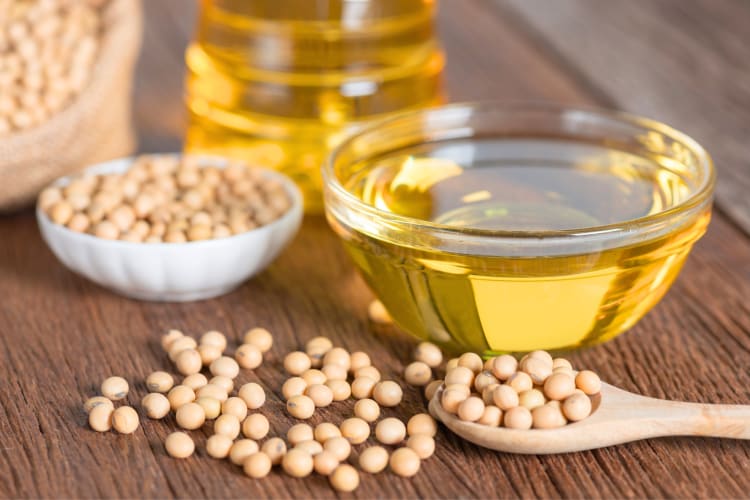
Exploring various olive oil substitutes can open up new culinary possibilities. Whether you’re seeking a neutral and high smoke point oil for high-heat cooking or a flavorful alternative for dressings and marinades, these substitutes offer versatility and unique qualities that allow you to create delicious dishes even when you're all out of olive oil.
For even more ways to explore your favorite foods, check out other experiences happening on Cozymeal.
